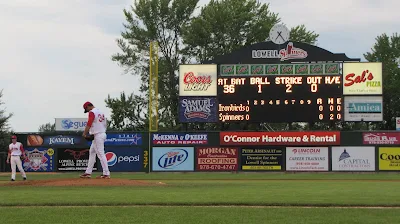Bruce Crabbe Interview Part 2: Kept Grinding
 |
| Lowell Spinners manager Bruce Crabbe, right, waits between innings at Joseph Bruno Stadium in Troy, NY in June 2012. (G21D Photo) |
Bruce Crabbe made steady progress through the Cubs system, making AAA by his fourth season.
Then he stayed at AAA. For the next six seasons.
"You deal with it like you deal with anything," Crabbe told The Greatest 21 Days recently of his time spent in AAA, without making the majors. "You just keep grinding away. You just hope someday that you're going to catch a break."
"In that time frame a lot of things can happen," Crabbe continued a short time later, "injuries and trades and things like that. And, unfortunately, it never happened for me."
Crabbe spoke with The Greatest 21 Days recently at Joseph Bruno Stadium in Troy, NY, as his New York-Penn League Lowell Spinners, the short-season affiliate of the Boston Red Sox, visited the Tri-City Valley Cats.
Crabbe covered his start in the game through his late father, his playing days working his way up to AAA, but never able to make the majors and his coaching days, trying to shepherd his young players on to the next level.
Crabbe's professional career started after a college career that took him for a year to Gulf Coast Community College and three years at the University of Florida.
Out of Florida, Crabbe was signed by the Cubs, taken in the 19th round of the draft. He then landed at short-season Geneva, then in the same league in which he is managing now.
 |
| Lowell Spinners manager Bruce Crabbe, grey hat, meets with umpires and opposing manager Stubby Clapp before a June 2012 game at Joseph Bruno Stadium in Troy, NY (G21D Photo) |
It was the same league, Crabbe recalled, but still far different. "Back then, the New York-Penn League didn't have fields like this," Crabbe said, referring to the modern Bruno Stadium field, similar to Lowell's.
He recalled it especially being an eye-opener coming out of a big college program like Florida.
Being so far away from home, though, Crabbe credits a good upbringing with making him prepared.
"When you get into this level, I mean you're playing every day," Crabbe said. "You don't really have time for things off the field and the distractions. You're into what you're doing and playing baseball was what I wanted. It's a nonstop grind,"
"The days went fast. It was games every day," Crabbe added. "It was like Groundhog Day, just like it is now."
Crabbe hit .307 at Geneva, then moved to single-A Peoria for 1985. At Peoria, he hit .313. He then went through Pittsfield in 1986, then hit AAA Iowa in 1987.
 |
| Lowell Spinners players warm up before a June 2012 game at Joseph Bruno Stadium in Troy, NY. (G21D Photo) |
At Iowa, though, he stopped moving up and he started staying put. He stayed there for three seasons.
"You get there, but there comes a time you're not a prospect, you're kind of a guy that could fill a spot," Crabbe said. "That's kind of what happened with me."
Crabbe moved to the Braves system in 1990, playing that year and the next at AAA Richmond. He played his final season in 1992 with the Blue Jays at AAA Syracuse.
Throughout the six years, though, Crabbe's break never came.
Along the way, though, Crabbe recalled once playing in front of a major league-size crowd at Mile High Stadium one Fourth of July with Iowa. "I was nervous, man," Crabbe recalled. "There were a lot of people in the stands. I had never played in front of that many people."
 |
| The scoreboard at Lowell's LeLacheur Park in August 2011. Bruce Crabbe managed at Lowell in 2010 and 2012. (G21D Photo) |
Then there were the road trips, the players and the managers.
About getting to the majors, though, Crabbe said he doesn't think he ever came to the realization that he wouldn't make it, until he was finally done.
That's because, he said, he believes he knew what it took, both offensively and defensively. He'd played against enough major leaguers at AAA to show that. He was also a lifetime .278 hitter.
"I could hit, I could play just about every position on that field," Crabbe said. "It was just a matter of getting a chance to get to the next level to show it."
Then, finally, Crabbe recalled breaking his hand in 1992. A coaching opportunity came along and he felt it was time.
Then came his second career, as a manager and a coach in the minors.
Go to Part 3: Good Things
Part 1: Next Level | Part 2: Kept Grinding | Part 3: Good Things
